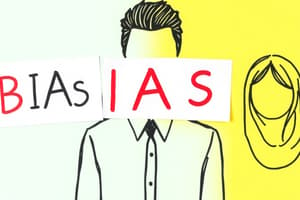Podcast
Questions and Answers
What is a potential outcome of a security guard engaging in discriminatory practices?
What is a potential outcome of a security guard engaging in discriminatory practices?
- Improving the overall safety and well-being of individuals
- Enhancing trust in the security guard's ability
- Creating a hostile environment for certain groups (correct)
- Reducing tension and conflicts
How can ignorance of bias consequences affect decision-making?
How can ignorance of bias consequences affect decision-making?
- Promoting fair and just decisions
- Building trust in the security team
- Leading to unfair judgments and actions (correct)
- Enhancing the reputation of the security guard
What is a potential outcome of implementing biased policies and practices due to a lack of comprehension of bias consequences?
What is a potential outcome of implementing biased policies and practices due to a lack of comprehension of bias consequences?
- Enhancing the reputation of the security team
- Perpetuating systemic injustices (correct)
- Strengthening the security measures
- Fostering a harmonious relationship with the community
What is the primary benefit of diversity mentioned in the text?
What is the primary benefit of diversity mentioned in the text?
Which of the following is NOT mentioned as a form of diversity in the text?
Which of the following is NOT mentioned as a form of diversity in the text?
Why is encountering various types of people important for security guard professionals?
Why is encountering various types of people important for security guard professionals?
What is the negative consequence of affinity bias?
What is the negative consequence of affinity bias?
What are some strategies to mitigate biases mentioned in the text?
What are some strategies to mitigate biases mentioned in the text?
What is the recognized influence of bias recognition training on decision-making?
What is the recognized influence of bias recognition training on decision-making?
What are some types of bias discussed in the text?
What are some types of bias discussed in the text?
What is the negative consequence of in-group and out-group bias?
What is the negative consequence of in-group and out-group bias?
What are the potential consequences of engaging in biased behavior without understanding its impact?
What are the potential consequences of engaging in biased behavior without understanding its impact?
What is the potential consequence of a security guard succumbing to the availability heuristic?
What is the potential consequence of a security guard succumbing to the availability heuristic?
What does addressing anchoring bias involve for security guards?
What does addressing anchoring bias involve for security guards?
What is the emphasis of objective decision-making for security guard professionals?
What is the emphasis of objective decision-making for security guard professionals?
What can the halo effect help security guards prevent?
What can the halo effect help security guards prevent?
What is a key step in addressing anchoring bias for security guards?
What is a key step in addressing anchoring bias for security guards?
What does promoting inclusivity in security practices involve?
What does promoting inclusivity in security practices involve?
Flashcards are hidden until you start studying
Study Notes
Addressing Bias for Security Guards
- The horns effect can cause a security guard to negatively judge an individual based on a single incident, potentially leading to unfair treatment and strained community relations.
- Conversely, the halo effect allows security guards to assess individuals based on their current behavior, preventing biases from influencing overall judgments and contributing to fair and effective security practices.
- Anchoring bias may lead a security guard to rely too heavily on initial, potentially irrelevant information when assessing a security threat, compromising the overall effectiveness of security measures.
- Addressing anchoring bias involves actively seeking updated and relevant information when assessing security threats, ensuring decisions are based on accurate and current information, contributing to effective security practices.
- Succumbing to the availability heuristic may cause a security guard to overestimate the likelihood of a particular threat due to recent media coverage, potentially leading to disproportionate security measures and unnecessary disruptions.
- Overcoming the availability heuristic involves actively seeking a balanced understanding of potential threats, preventing biases from distorting risk assessments, and contributing to more accurate and effective security decisions.
- Steps to address bias include self-awareness, education and training, promoting inclusivity, objective decision-making, and legislation and policies.
- Self-awareness involves recognizing biases, engaging in self-reflection, and seeking educational resources to understand and address biases.
- Education and training through diversity and inclusion programs can enhance a security guard's ability to recognize and challenge biases, contributing to a more informed and fair approach.
- Promoting inclusivity involves taking proactive steps to engage diverse perspectives and ensure security practices are fair and considerate of everyone's concerns.
- Objective decision-making emphasizes evaluating candidates based on merit and qualifications, creating a fair and unbiased hiring process.
- Collaboration with management to implement anti-discrimination policies ensures that biased behavior is addressed with legal consequences, creating a more respectful and inclusive workplace.
Studying That Suits You
Use AI to generate personalized quizzes and flashcards to suit your learning preferences.




